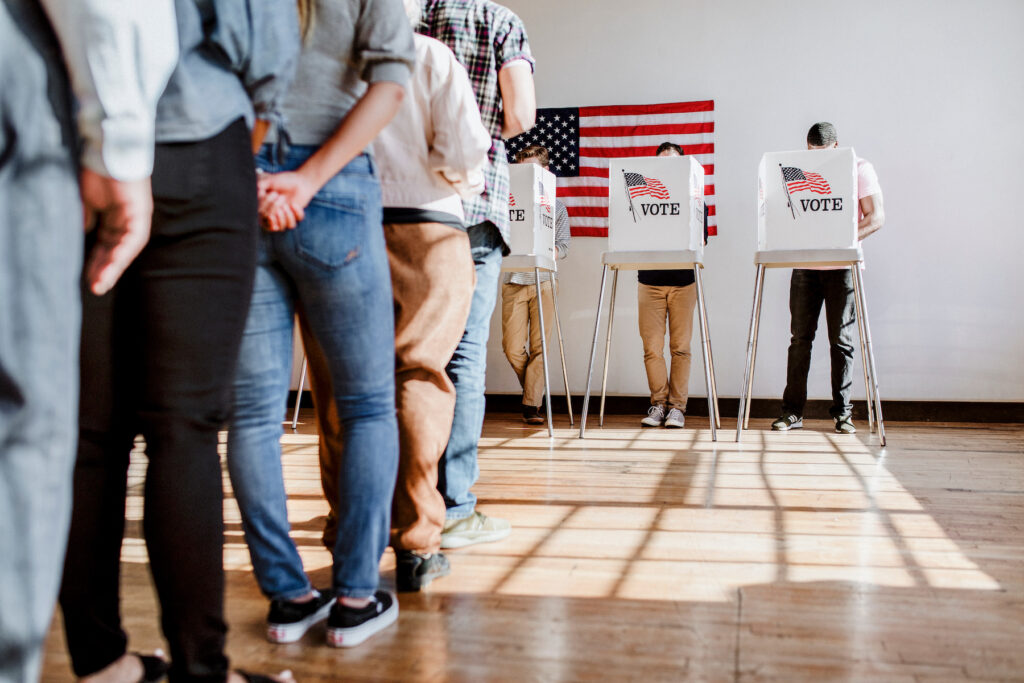Keep an eye out—ballot proposal petitions are coming to a clipboard near you. Whether at a farmers market, pro-democracy demonstration, or neighborhood festival, you may be asked to sign. These proposals let citizens help write the rules that govern our state.
Here’s how the process works and what issues might make it to your ballot in 2026.
What Is a Ballot Proposal?
A ballot proposal is a question or issue that appears directly on the ballot for voters to decide. It’s a form of direct democracy that allows citizens to propose new laws, amend existing laws or the state constitution, or vote on questions referred by the legislature.
Signature Requirements
To qualify for the ballot, petitions must gather between about 350,000 and 550,000 valid signatures within 180 days. These signatures are then reviewed by the Secretary of State’s office for validity.
Petition Format
Each petition sheet must include a 100-word summary at the top. While this summary provides an overview, it is important for voters to read carefully.
Circulators
Because petition circulators are not legally required to provide accurate information, voters should rely on the text of the petition rather than verbal descriptions.
Rules for Signing
Each person may sign only once for a given petition. Duplicate signatures will not be counted.
Where You’ll See Petitions
Petitions are commonly circulated at festivals, farmers markets, public events, and among friends or community members.
The League of Women Voters is committed to mobilize 8.5 million voters. Check out the initiative at Unite and Rise 8.5.
What Proposals Are on the Ballot?
Rank MI Vote
Voter ranks candidates in order of their preference.
To win, a candidate has to get 50% of the vote.
Basically, this will allow for instant runoff elections.
Initially only voters’ top choice is counted, but if no candidate has an immediate majority, the candidate with the least votes is eliminated. All the voters who chose the eliminated candidate then have their second-place votes distributed to the remaining contestants. The process repeats until one candidate has more than 50% of the vote.
What to know:
- Ranked choice voting would be used in Michigan’s congressional and presidential primary and general elections, the primary for governor, and the general elections for governor, secretary of state, and attorney general. The Michigan Legislature would be excluded, and local offices could opt in.
- Michigan would join Maine as the only other US state to use ranked choice voting for both primary and general elections for federal offices.
- The change would require the state and local officials to effectively overhaul how they administer elections.
- The proposal would amend the Michigan Constitution, which means organizers need to collect 446,198 signatures in a 180-day window to make the 2026 general election ballot.
What supporters say: Rank MI Vote says ranked choice voting will reduce polarization, prevent spoiler candidates, and lead to the election of candidates who better represent their constituents.
What opponents say: Critics of the proposal argue ranked choice voting would confuse voters, delay when election results come out and lead to less representative candidates. They are also concerned about the difficulty election officials might have in implementing the changes.
Invest in MI Kids
Citing struggling schools statewide, organizers of the Invest in My Kids initiative want to boost funding by raising taxes on individuals making more than $500,000 a year or couples making more than $1 million.
What to know:
- The proposal would impose an additional 5% tax on any income that exceeds those $500,000 (individual filer) or $1 million (couple).
- Michigan currently has a 4.25% flat tax on all income. That’s written into the state constitution, so the proposal would require this amendment to pass in the 2026 election.
- Money generated by the tax would have to go to local public school districts.
What supporters say: The increased funding would lower class sizes, help recruit and retain teachers with better pay, and improve learning environments with facility upgrades.
What opponents say: Critics like the Michigan Chamber of Commerce say the “fair share surcharge” term adopted by the group is a misleading term used to mask a tax increase, which would hurt business and economic investment in Michigan. Opponents also argue the tax would unfairly benefit public school districts and not charter or private schools, and that Michigan’s poor academic performance isn’t tied to a dearth of funding.
Voters to Stop Pay Cuts
This would repeal and replace a 2018 law.
Here’s the history: In 2018, citizens got enough signatures to add a petition to the ballot to increase Michigan’s minimum wage and eliminate a lower tipped wage for restaurant workers. The legislature then adopted and amended the proposal to keep it off the 2018 ballot.
What to know:
- Under current law, state’s $12.48 minimum wage will hit $15 by 2027 and increase with inflation. The repeal proposal would actually increase the rate more slowly, raising it to $14.97 by 2028 and then rising with inflation.
- The biggest impact of the proposal would be eliminating the state’s lower minimum wage for tipped workers, like those at restaurants. Under current law, the $4.74 rate will rise to 50% of the minimum wage by 2031. Under the proposal, the tipped wage would become 100% of the minimum wage by 2030 and rise alongside it.
- If supporters collect enough signatures, the referendum would appear on November 2026 ballot but immediately freeze the implementation of the law they hope to repeal, at least until the election.
What supporters say: One Fair Wage wants to repeal the law so that wages better reflect the original legislative petition, which received enough signatures to go before the legislature in 2018. The group has decried lawmakers’ repeated effort to intervene and water down the policies.
What opponents say: Opponents of the repeal argue the increase in tipped wage will “decimate” the restaurant industry and are quick to point out the law sped up the minimum wage increases relative to the court ruling. Repealing the law would set the wage back. They also argue customers would stop tipping, effectively lowering their wages, though this point has been hotly debated.
Michiganders for Money Out of Politics
What to know:
- Bans regulated utilities (e.g. DTE, Consumers Power, Blue Cross, AT&T) and state government contractors — along with their senior employees — from making contributions to state candidates and a broad array of other political spending.
- Requires any outside spending group (e.g., PAC) making even tangential reference to a candidate or ballot issue to report their spending totals and donors to the state in the months leading up to an election.
What supporters say: This proposal helps close loopholes that allow businesses to contribute large sums to candidates and improves transparency of political donations.
What opponents say: The Michigan Chamber of Commerce, one of the state’s most powerful business interest groups, has blasted the proposal as a broad attack on free speech rights.

AxMITax
This would eliminate all property taxes in Michigan and make it harder to raise any other taxes in the future.
What to know:
- End Michigan property taxes, which are a significant source of revenue for schools and local governments. The petition would direct the state to send more sales tax revenue to local governments, along with more money from marijuana, alcohol and tobacco taxes.
- Any future tax increase at the local level would require approval of 60% of voters, while any state tax increases would require two-thirds support in the Michigan Legislature.
- Michigan gained $20.4 billion from property taxes statewide in 2024, representing 27% of local governments’ overall revenue in Michigan.
What supporters say: The group argues property taxes are unfair to Michiganders who already pay taxes on income. They argue the state should tax consumption instead of property and contend that any funding shortfalls would be avoided by reallocating state resources toward local governments.
What opponents say: Critics say the proposed change is sweeping, unrealistic and would lead to an immediate fiscal crisis, essentially forcing a drastic shrinking in the size of state and local governments. They say supporters have not proven that their proposed reallocation would protect funding for essential government services that would be put at risk.
Americans for Citizen Voting
This proposal aims to require proof of citizenship to register to vote and tighten voter ID rules.
What to know:
- Require individuals to verify US citizenship during the voter registration process.
- It’s already illegal for noncitizens to vote, but the state suspects at least 15 noncitizens managed to cast ballots in 2024 (5.7 million ballots were cast in Michigan in 2024).
- Also requires voters to present photo ID for in-person voting, eliminating a current option that allows voters without ID to sign an affidavit of identity under penalty of perjury.
- Lower-income citizens could apply for a free ID by claiming a hardship under a process the state Legislature would establish.
What supporters say: It is already illegal for noncitizens to vote in Michigan The proposal would close loopholes in Michigan law that could create openings for noncitizens to cast ballots and dilute the voting power of citizens.
What opponents say: Election officials and voting rights groups across Michigan argue the proposal could disenfranchise voters by making the process more difficult, including women who changed their name upon marriage. Some on both sides of the aisle questioned some of the provisions, with one GOP member suggesting it could allow for “weaponizing” against other voters.
Constitutional Convention
This important option will be on the 2026 ballot.
The 1963 Michigan Constitution mandates that voters could vote every 16 years whether to have a constitutional convention.
- It was resoundingly defeated the three previous times.
- If the majority vote yes, everything in the state constitution is on the table (e.g. abortion, gun rights, death penalty, etc.).
If yes, there will be a primary and general election for delegates in 2027.

Stay Informed
Ballot proposals can reshape Michigan’s laws in lasting ways. As 2026 approaches, staying informed will help voters make confident decisions when these questions appear on the ballot.
About Lenawee Indivisible:
Lenawee Indivisible is a grassroots organization dedicated to defending democracy, protecting voting rights, and holding elected officials accountable—in Lenawee County, MI, and beyond. We believe in informed civic engagement, inclusive communities, and building power through people. Learn how you can get involved.
